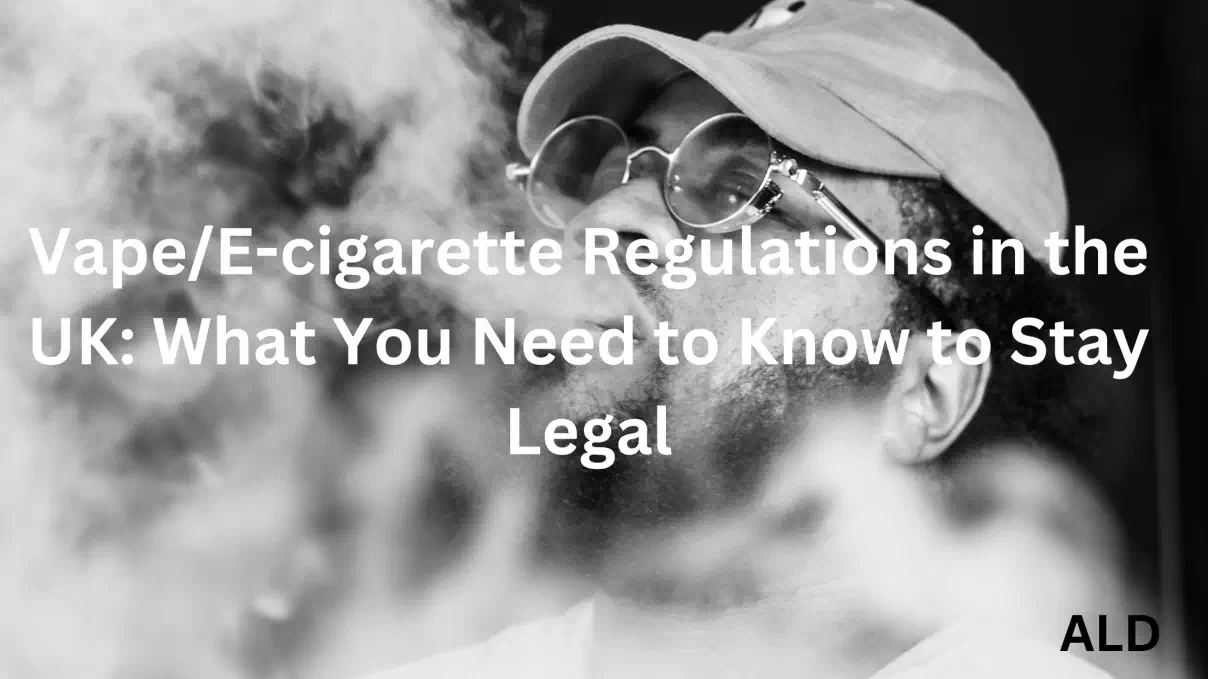E-cigarette Regulations in the UK: What You Need to Know to Stay Legal

28 September 2023

The e-cigarette industry in the UK has witnessed explosive growth in recent years, becoming a prominent alternative to traditional tobacco smoking. While vaping is typically considered less harmful than smoking cigarettes, it is vital to understand and comply with the relevant regulations.
So, whether you're a seasoned vaper or a business owner in the e-cigarette industry, staying up-to-date with these vape/e-cigarette regulations in the UK is not only responsible but also essential for the continued success and safety of most vapers. Let's dive into what you must know to ensure you're legally vaping in the UK.
What are the Vape/E-cigarette Regulations in UK?
In this guide, we will deliberate the critical aspects of vape/e-cigarette regulations in the UK, including the following;
1. Vaping in Public Areas
Vape/E-cigarette Regulations in the UK
One prominent aspect of vape/e-cigarette regulations in the UK relates to where vaping is permitted in public areas. The UK has taken a balanced approach by allowing vaping in some public spaces while maintaining restrictions in others. As of 2021, vaping is generally permitted in outdoor public areas, but individual establishments and local authorities can decide to prohibit it.
For example, many shopping malls, restaurants, and bars have banned vaping. It is always best to check with the owner or manager of the premises before vaping to avoid any problems.
2. Vaping in the Car
Vaping in private vehicles isn't prohibited by UK law, but essential safety considerations exist. Experts recommend caution when vaping in cars, especially if children or non-vapers are present. Dr. David Johnson, a toxicology specialist, cautions, "Vaping in enclosed spaces may expose passengers to secondhand aerosol, which can contain harmful substances."
NOTE: Vaping can produce a lot of vapor, reducing visibility and making it difficult to concentrate on driving. It is also essential to be considerate of other passengers in the car, as some people may be sensitive to the smell of vapor.
3. Vaping on Public Transport
Vaping on public transport, including buses and trains, is typically prohibited. This aligns with the UK's approach to tobacco smoking on public transport, aimed at safeguarding passengers' health. Similarly, vaping can produce a lot of vapor, which can be disruptive to other passengers and can also pose a fire hazard.
4. Vaping in Pubs and Bars
Vaping in enclosed public spaces like pubs and bars is subject to the individual policies of the establishment. Many venues have banned vaping indoors to prevent any confusion between vaping and smoking. According to a survey by the Vaping Industry Association, as of 2020, approximately 85% of UK pubs and bars had a no-vaping policy.
5. Product Restrictions
UK vape/e-cigarette regulations set strict standards for product safety. E-liquids must adhere to quality standards, and vaping devices must meet safety requirements. There are many restrictions on vape products in the UK, including:
- Maximum nicotine strength of 20mg/ml
- A maximum e-liquid tank capacity of 2ml
- A ban on certain ingredients, such as colorings, caffeine and taurine
- Child-resistant packaging and tamper-evident seals
- Labeling requirements and warnings
It is important to note that these restrictions apply to both vaping devices and e-liquids.
6. Vaping Age Restrictions
The UK prohibits the sale of vaping products to individuals under the age of 18. This measure aligns with the intention to prevent youth access to these products. According to the RCPCH, in a recent study, only 4% of 11-15-year-olds reported using e-cigarettes, indicating that age restrictions have been effective.
Recent Updates and Changes to Vape/E-cigarette Regulations in the UK
The UK government is reviewing the vape/e-cigarette regulations, but there have been a few recent amendments and updates. Let's explore some notable updates and their implications.
· Removal of Menthol Cigarettes and Flavored Vaping Products:
One significant change in UK vape regulations is banning menthol cigarettes and flavored vaping products. Implemented in May 2020, this measure aimed to reduce the appeal of smoking and vaping to young people. According to a report by Tobacco Tactics, this ban was based on evidence that flavored products are more attractive to youth.
· Maximum Nicotine Concentration:
In recent updates, regulators have set a maximum nicotine concentration level for e-cigarettes. As of 2020, e-liquids sold in the UK cannot exceed 20mg/ml of nicotine content. This change aligns with expert recommendations to mitigate potential health risks associated with high nicotine concentrations.
· Advertising and Promotion Restrictions:
Regulations governing the advertising and promotion of vaping products have evolved. Stricter rules now apply to online and social media advertising. The goal is to prevent marketing that could appeal to young non-smokers.
NOTE: In April 2023, the government announced plans to close the loophole that allows companies to give out free samples of vaping products to under-18s. Selling vaping products to under-18s is pro, but companies can give out free samples. The government is concerned that companies exploit this loophole to target young people with vaping products.
In January 2023, the government also launched a consultation on proposals to ban disposable vapes. Disposable vapes are small, single-use vaping devices that have become increasingly popular. However, there are concerns about the environmental impact of disposable vapes and the fact that they are often marketed to young people.
· Product Labeling and Packaging
Updates in labeling requirements have also been introduced. Vape product packaging must now include more detailed warnings about potential health risks and nicotine content. These changes are aimed at enhancing consumer awareness.
Reasons for the Changes
The UK government is making changes to the vape/e-cigarette regulations for some reasons.
- The government is concerned about the rising popularity of vaping among young people and the environmental impact of disposable vapes.
- Also, the government wants to make it more difficult for young people to access vaping products.
The Future of Vape/E-cigarette Regulations in UK
The future of vape/e-cigarette regulations in the UK is uncertain, but several trends suggest that the rules will become stricter in the coming years. To add insight into what lies ahead, we turn to experts and available data to explore possible trajectories.
One of the key trends is the growing concern about the rising popularity of vaping among young people. That said, a House of Lords Library study found that the number of young people vaping in the UK has increased by more than 50% in the past three years. This has led to calls from some public health experts for vaping to be banned in public places and for stricter restrictions on the advertising and marketing of vape products to young people.
Another key trend is the growing evidence of the health risks of vaping. Health impact assessments related to vaping may become more prevalent to inform future decisions. These assessments will evaluate the long-term health effects of vaping, potentially leading to regulation adjustments.
How to Stay Legal When Vaping in the UK
To ensure you stay on the right side of the law while enjoying your vaping experience, it's crucial to understand and adhere to the regulations. The following points will help you stay legal when vaping in the UK.
· Be aware of the age restrictions.
The most fundamental step is to ensure you are of legal vaping age, which is 18 years old in the UK. Retailers are legally obligated to check your age before selling vaping products. Be prepared to provide identification to verify your age and only purchase from reputable sources.
· Avoid Vaping in Prohibited Areas
Respect the regulations on where you can and cannot vape. Generally, vaping is permitted in outdoor public spaces, but individual businesses, public transportation, and indoor establishments like pubs and restaurants may have their policies. Always abide by the rules of the place you're in.
· Adhere to Product Standards
Only use vaping products that meet UK safety and quality standards. Look for products that comply with the Tobacco and Related Products Regulations. Avoid unregulated or counterfeit vaping devices and e-liquids, as these can pose safety risks.
· Be Mindful of Nicotine Content
Be aware of the nicotine concentration in your e-liquids. As per UK regulations, the maximum limit for nicotine concentration in e-liquids is 20mg/ml. Exceeding this limit is illegal and could pose health risks.
· Responsible for Disposal of Batteries and Cartridges
Dispose of used vaping batteries and cartridges responsibly. Many local recycling centers accept e-waste, including vaping equipment. Avoid littering or discarding vaping waste improperly.
· Stay Informed and Updated
Finally, keep yourself informed about the latest vape/e-cigarette regulations in the UK. Regulations can change over time, so staying up-to-date with any amendments or updates from official government sources or relevant authorities is essential.
FAQs about Vape/E-cigarette Regulations in UK
· Do you need a License to sell vapes in the UK?
You do not need a specific license to sell vaping products (e-cigarettes and e-liquids) in the UK. However, you must comply with several regulatory requirements.
· Can you bring vapes through customs UK?
Yes, you can bring vapes through customs in the UK. However, some restrictions exist: You can only carry 200 cigarettes, 100 cigarillos, 50 cigars, or 250g of tobacco.

























